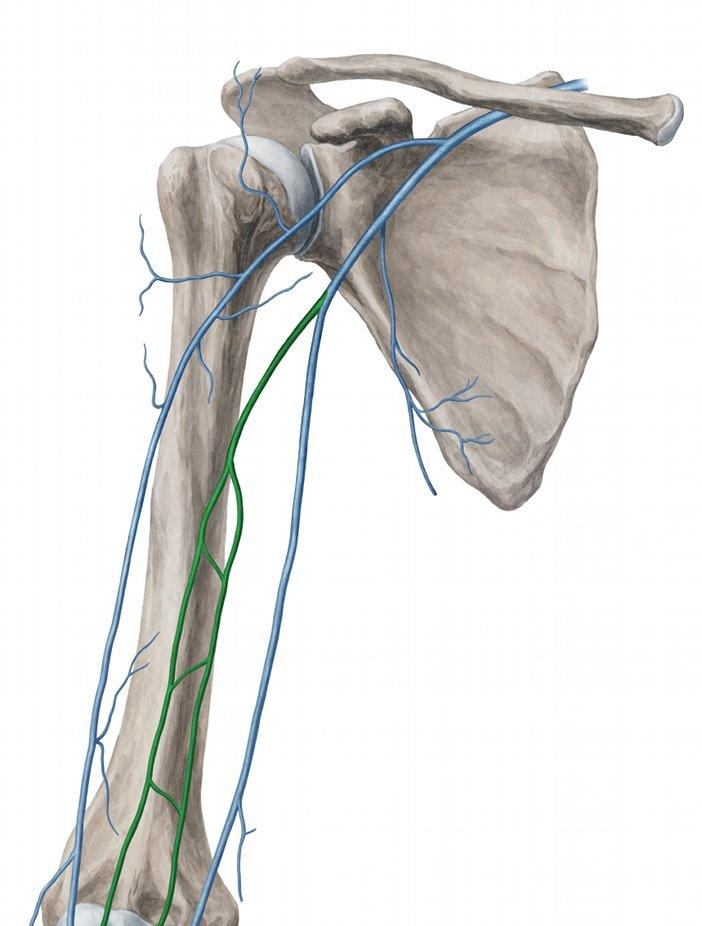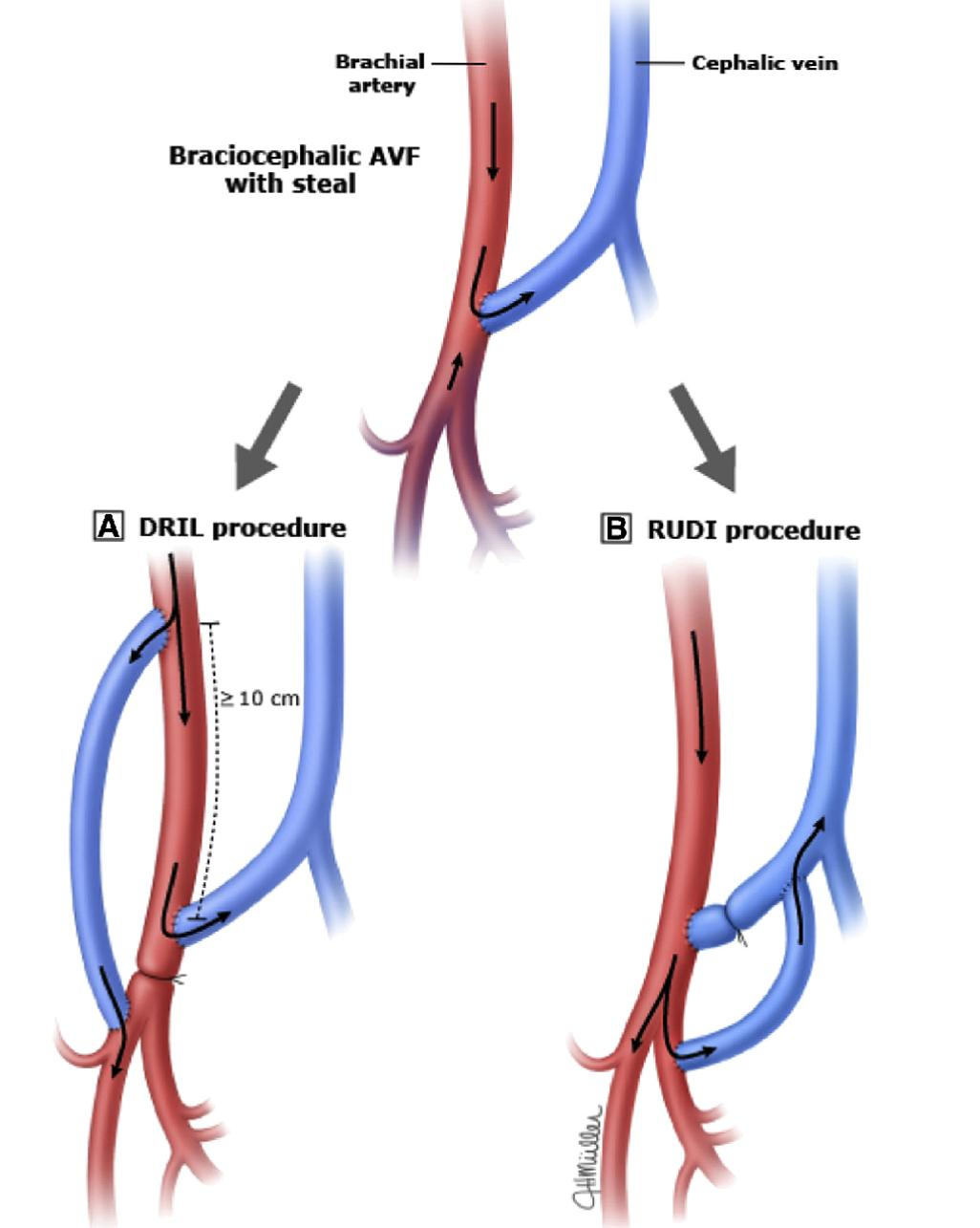
Brachial vein
By : Safa QusayInformation
The brachial vein is one of the largest components of the deep venous system (where the veins in the human body are divided into superficial and deep veins , whose division depends on whether it is superficial or penetrating the deep layers of muscles).
Note :
Brachial vein has the same course as brachial artery but in the opposite direction (with some minor differences),that means that the beginning of the vein is the end of the artery.
Note :
Brachial vein has the same course as brachial artery but in the opposite direction (with some minor differences),that means that the beginning of the vein is the end of the artery.
Course of the brachial vein
The brachial vein started in the elbow, exactly in the cubical fossa by union or connection of two venues( radial and ulnar) .
Note : the radial vein is smaller than the ulnar vein.
Note : the radial vein is smaller than the ulnar vein.

Then it continues running in the middle of the arm, where it is deep in the muscles (has branches to drain from the anterior and posterior compartments of the arm, like biceps brachii and brachialis muscles )
Relation in this case
•It is deep (closed by the arm components)
•But it is superficial to the medial nerve and brachial artery.
Relation in this case
•It is deep (closed by the arm components)
•But it is superficial to the medial nerve and brachial artery.

Then it turns a little towards the medial to arrive to the lower edge of the teres major m.

this place (in the lower edge of the teres major m.), the brachial vein meets the basilic vein to form the axillary vein.
The axillary vein is formed by the union of the brachial vein and the basilic vein.
Note
It is one of the superficial venous system. It arises from the network of the dorsal venous in hand . It runs superficial in the medial side of the forearm and arm. When it arrives to the lower edge of teres major m. , it pierces the deep fascia to communicate with brachial vein to form axillary vein. Branches of brachial vein: It has a collection of the small branches drain the blood from the muscles in the arm (in the posterior and anterior components).The axillary vein is formed by the union of the brachial vein and the basilic vein.

Union of brachial and basilic vein
Medical information:
The deep and superficial venous system are is completely separated, as there is a communication between the two systems by perforating veins.
Note
Perforating veins are small branches which connect between two systems and may have valves to prevent the inversely-blood flow return. 
Clinical notes about brachial vein:
Arteriovenous(AV) fistula
is a surgery used to connect an artery to a vein for patients who are at the end - stage of the renal disease , in order to receive dialysis .
The result of this surgery is an enlarged vein to provide easy a vascular access to life - saving hemodialysis treatments.
The surgery is done by joining a superficial vein to an artery . This technique leads to a high blood flow through the vein , which often after 4 to 6 weeks be suitable to access for haemodialysis in patients (by renal failure ).
The result of this surgery is an enlarged vein to provide easy a vascular access to life - saving hemodialysis treatments.
The surgery is done by joining a superficial vein to an artery . This technique leads to a high blood flow through the vein , which often after 4 to 6 weeks be suitable to access for haemodialysis in patients (by renal failure ).

The types of AV fistulas include :
1.Fistula of the Radiocephalic
By joining : the cephalic vein to the radial artery.
Place where the connection happens : near to the wrist ,above it.
By joining : the cephalic vein to the radial artery.
Place where the connection happens : near to the wrist ,above it.

2.Fistula of the Brachiocephalic
By joining : the cephalic vein to the brachial artery.
Place where the connection happens : at the elbow crease.
By joining : the cephalic vein to the brachial artery.
Place where the connection happens : at the elbow crease.

3.fistula of the Brachiobasilic
By joining: the basilic vein to the brachial artery.
Place where the connection happens: at the elbow crease.
By joining: the basilic vein to the brachial artery.
Place where the connection happens: at the elbow crease.

References:
1.ENDOVASCULAR SURGEON ARTERIOVENOUS ( AV ) FISTULA FORMATION ,CHARLES P.E. MILNE M.B.B.S. ( Hons ) , F.R.A.C.S. ( Vasc ) , F.E.B.V.S. ( Hons ) , M.Surg VASCULAR & ENDOVASCULAR SURGEON
https://www.vascularsurgery.melbourne/arteriovenous--av--fistula-formation.html
2.Brachial vein ,kenhub
https://www.kenhub.com/en/library/anatomy/the-brachial-vein
3.Venous Drainage of the Upper Limb,Teach Me Anatomy
https://teachmeanatomy.info/upper-limb/vessels/veins/
4.Brachial vein, craig hacking, Radiopaedia
https://radiopaedia.org/users/hackingc?lang=us
5.MOORE Clinically Oriented ANATOMY Keith L. Moore Arthur F. Dalley Anne M.R. Agur(691,718,737).
Figures are from
•MOORE Clinically Oriented ANATOMY 6.15.,
•JaypeeDigital eBook Reader
•Kenhub
•Radiopaedia.org
•Tri_city vein center
•Research gate
1.ENDOVASCULAR SURGEON ARTERIOVENOUS ( AV ) FISTULA FORMATION ,CHARLES P.E. MILNE M.B.B.S. ( Hons ) , F.R.A.C.S. ( Vasc ) , F.E.B.V.S. ( Hons ) , M.Surg VASCULAR & ENDOVASCULAR SURGEON
https://www.vascularsurgery.melbourne/arteriovenous--av--fistula-formation.html
2.Brachial vein ,kenhub
https://www.kenhub.com/en/library/anatomy/the-brachial-vein
3.Venous Drainage of the Upper Limb,Teach Me Anatomy
https://teachmeanatomy.info/upper-limb/vessels/veins/
4.Brachial vein, craig hacking, Radiopaedia
https://radiopaedia.org/users/hackingc?lang=us
5.MOORE Clinically Oriented ANATOMY Keith L. Moore Arthur F. Dalley Anne M.R. Agur(691,718,737).
Figures are from
•MOORE Clinically Oriented ANATOMY 6.15.,
•JaypeeDigital eBook Reader
•Kenhub
•Radiopaedia.org
•Tri_city vein center
•Research gate
